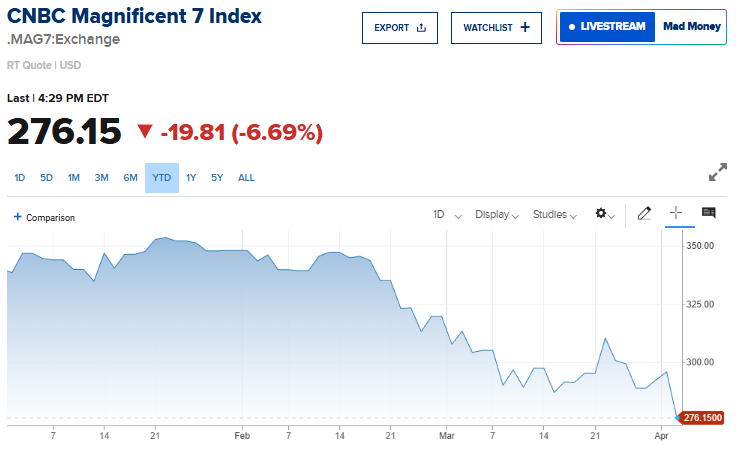Trade Alert: The Only Streamer Focused on Sports
I often wonder if we are foolish to bother talking about the broader markets. Perhaps, the best reason to discuss broader markets is only in the context of how the market is treating individual stocks in specific sectors — and even then, most of the time, it’s mostly a waste of time to talk broader markets. That said, the markets are a collection of individual stocks and I do think there’s value in making sure we’re not overly long when the risk/reward in most individual stocks based on valuations, growth rates, sentiment and the economy are high, as they are right now.
In that vein, one thing I think I’ve finally figured out about the markets and how they react to news in both individual stocks and, therefore in the broader markets, lately is that there’s usually a delayed reaction. When my littlest daughter who has Trisomy 13 was younger, she often had a delayed reaction to stimuli. For example, when we’d sneak up to her and go, “Boo!”, it’d usually be a half a second or so before she’d giggle. For most people, that reaction would be instant. The markets lately, as millions of retail investors moved into the markets for the first time and now trade around the news, have had a delayed reaction to many events. Companies such as Infinity a few weeks ago can report great results and their stocks will go down at first before finally reacting to the good news a few days later.
On Friday the markets had a big reversal from their highs and sold off into an ugly close. Old school professionals like Jim Cramer on TV this morning were then looking to sell this morning’s early pop at the open in expectation that, as for most of my career was so often the case, the markets would then reverse again and sell off today. But the retail and momentum investors just bought the dip as they have all year and the markets closed steady. It will be interesting to see if the markets are having a delayed reaction once again and that what was supposed to be today’s second intraday sell-off will happen tomorrow or Wednesday instead. Feet-to-fire, I expect that’s probably the set-up.
Forgetting all that and focusing instead on looking for great Revolutionary ideas at reasonable valuations, I’ve got a new name for us tonight. fubotv (FUBO) is a streaming TV service with a partial focus on sports programming (and, soon, betting).
When I started researching fubotv a few weeks ago, I didn’t realize that it was a direct competitor to my YouTube TV service (not to be confused with YouTube itself), which I use for cable TV since last year. But sure enough, that’s what I found when I signed up for the service. And frankly, it’s got a much better interface and layout than YouTube TV does so my wife wants us to switch to fubotv permanently (which we probably will when the free trial month of fubotv is up).
While all the streaming companies are mostly focused on serving recorded content to you (think Netflix, Disney +, HBO Go, Hulu, YouTube (not to be confused with YouTube TV, the aforementioned cable TV service), and the others), fubotv has focused on getting access to sports content for their subscribers. This focus on mostly live content is somewhat unique to sports and frankly puts fubotv in a spot where it could end up an acquisition target of one of the big streaming companies.
As for valuation, it’s surprisingly cheap relative to other growth stocks in the sector. The company is on track to grow revenues more than 150% this year to $570 million and analysts are looking for another 60% topline growth next year to more than $900 million dollars. The market cap right now is $3.8 billion meaning that the stock is trading at “only” 7x this year’s revenues and at just over 4x next year’s revenue estimates.
Another thing that’s compelling here is that the company hasn’t overpromised on its milestones as it grows to profitability in coming years. The company expects to have at least 3 million subscribers in 2026 — five years from up from the 680,000 subscribers as of the end of last quarter. With 10 million households in the US currently using a streaming service such as YouTube TV, SlingTV, Hulu Live TV, etc for live broadcast TV, that means fubotv’s market share is about 6 or 7% and growing from about 0% three years ago. About 80 million people/businesses in the US subscribe to some sort of cable TV service, so that means 70 million households can still cut the cord from traditional cable and satellite TV service to a streaming solution. Over the next five to ten years, there will be tens of millions of people who sign up for streaming TV, so let’s say 50 million subscribers will come to one of the streaming TV solutions. Assuming 10% market share, that’d be five million subscribers at an average of say $60 a month for nearly $3 billion per year in revenue. The company is currently running at about a zero gross margin rate here as they acquire rights to more sports content and compete for cable services against bigger competitors and I’d expect gross margins for the overall business to be closer to 40-50% in five years. The company is adding a higher margin gaming/sports gambling side of their business too as that becomes legal slowly across the US.
I have started to buy some common stock in FUBO for what I expect will be a mid-sized position in this name over the next two or three weeks.



